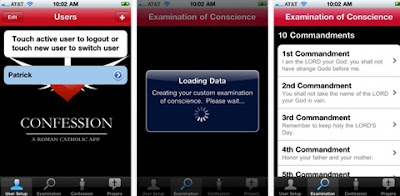Well, I guess it was only a matter of time. We live in world of convergence, where the overlap of trends and ideas has become a matter of eventuality, rather than possibility.
So I don't even find the energy to be surprised that the Catholic Church has approved the development and launch of a new iPhone app "to invite Catholics to engage in their faith through digital technology."
For a few years now, the Church has been struggling to find its place in our modern, GPS-enabled, augmented version of reality. At the same time, developers seeking their fortune have found the world of apps to provide a seemingly inexhaustible source of inspiration. As a result, these two unconnected trends have been racing towards each other, like theoretical trains in a high school maths problem.
At the point of impact, in amongst the smoke and twisted metal, we find ourselves faced with the prospect of an app called Confession (available for £1.19/$1.99). Penitent sinners, who find themselves too time-poor to sit in a cupboard and spill their guts to a priest, can now input their wrongdoings into a handy piece of software.
The BBC's coverage of the story points out that this newest wrinkle in the gradual modernisation of Catholicism follows on from the Pope's recent approval of social media. Last month, in his World Communications Address, Benedict XVI told young believers that the new technology provided a useful forum for people to share information with each other: "I invite young people above all to make good use of their presence in the digital world... It is important always to remember that virtual contact cannot and must not take the place of direct human contact."
Despite this warning, Confession's virtualisation of the penitence process suggests that Priests are being increasingly removed from many people's day-to-day religious behaviour. It's much easier to click your way through a bunch of tabs that help you to examine your conscience, rather than articulate your darker moments out loud.
More importantly, it also highlights the misgivings that many people have about the concept of Confession itself - that people can act with impunity, as long as they're willing to atone for their wrongdoing later. I'm not sure exactly what God told Moses on Mount Sinai, but I'm willing to speculate that his briefing made no mention of developing an algorithm that enables people to "keep track of their sins".
It'll also be interesting to see how much trust people are willing to place in the concept of ecclesiastical privilege. Given the frequency of security breaches and hacked accounts, it's hard to imagine the world's Catholics being willing to sign up to an online archive of all their moral shortcomings. Suddenly, the whole Wikileaks controversy is starting to look like a Jonah's storm in a teacup.


No comments:
Post a Comment